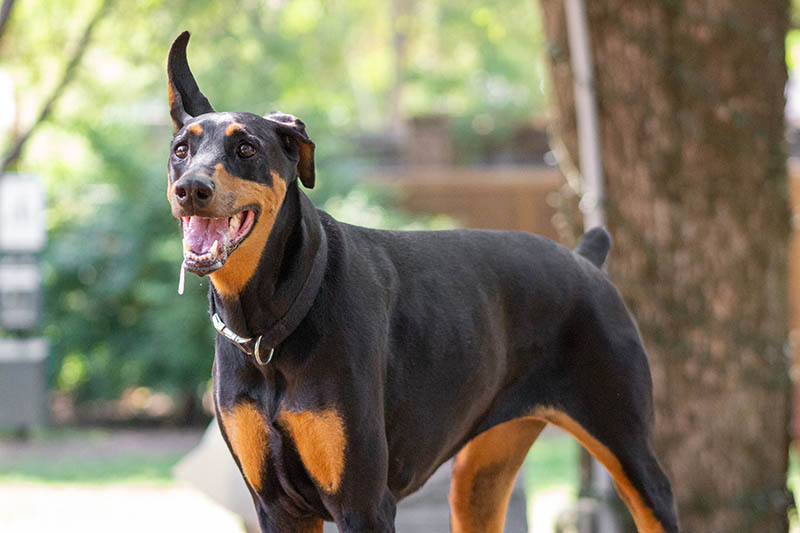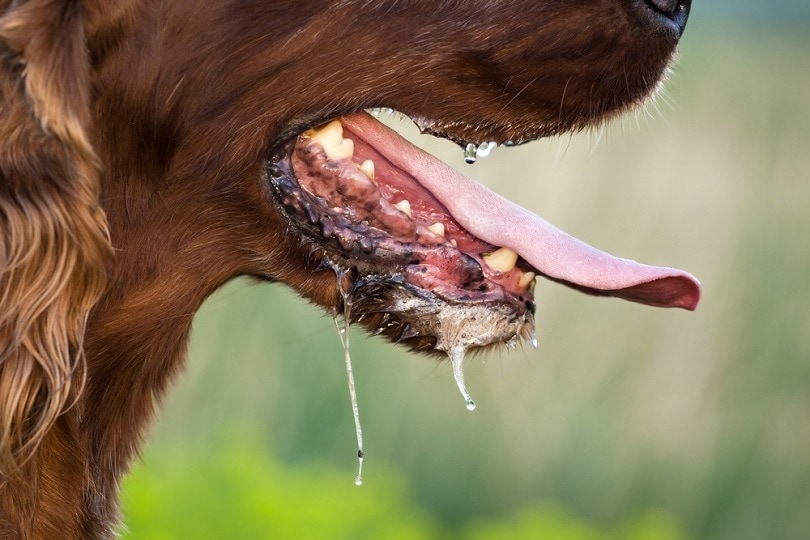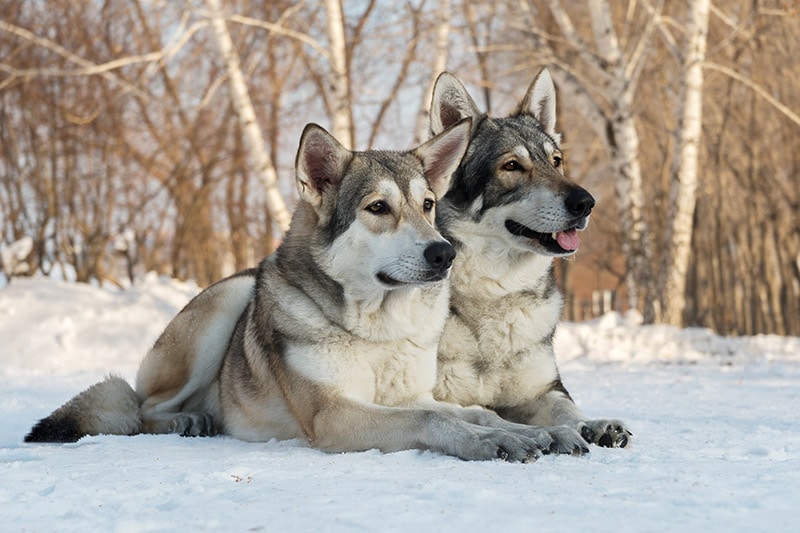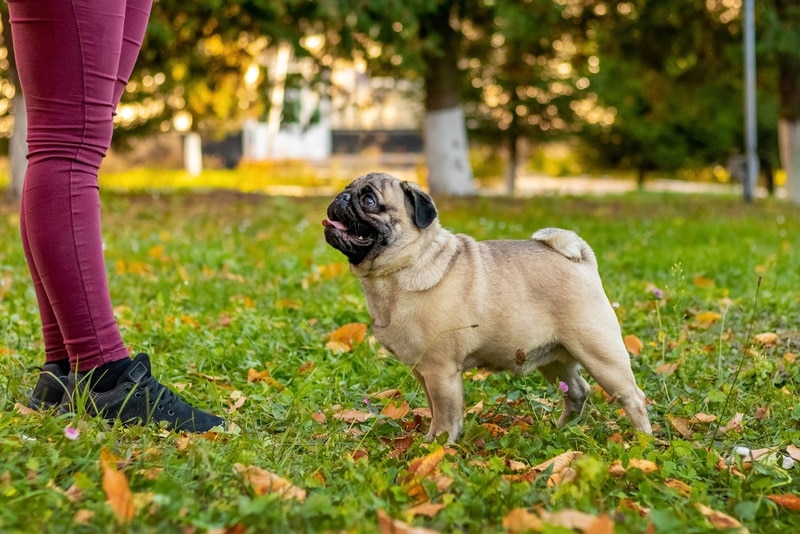Why Does My Dog Drool at the Dog Park? Common Reasons for This Behavior
By Jordyn Alger
Updated on

When you have a dog, you must inevitably confront the messier parts of dog ownership, like drool. Drooling is a normal behavior that emotions, scents, or other stimuli can trigger. It is not uncommon to see a dog drool when food is involved, such as when you are cooking a meal, but why might a dog drool at the dog park?
In this article, we will discuss reasons why your dog may drool at the dog park. We will also review normal and abnormal reasons for drooling so you can tell when a visit to the vet is necessary.
Why Dogs Drool at the Dog Park
For the most part, the reason why dogs drool at the dog park is nothing to be concerned about. Some dogs associate the park with pleasant, fun experiences. They may enjoy running around in the open nature, playing with other dogs, or both. Either way, their excitement can cause them to drool.
On the other hand, some dogs do not enjoy visiting the dog park. A dog park may be crowded, loud, or overwhelming to the dogs. If your dog dislikes the experience, they may be drooling due to anxiety.
While this isn’t a medical issue, it is still a cause for concern. Anxious dogs can become defensive or aggressive if they feel threatened, and a dog park is not a good place for an outburst. If your dog appears distressed at the dog park, it’s best to remove them from the area so they can settle down.
Try to determine what causes your dog’s anxiety. Is it the other dogs? Or is the park’s location in a loud, chaotic area? If you can pinpoint your dog’s stressors, you can work to find a solution. For example, if your dog is agitated by the other dogs, you can give them exercise and time in nature with a walk rather than spending time at the dog park.
If the dog park you frequent is crowded or overwhelming, you can search for a more relaxing environment. Dog parks are not essential, and some canines are much happier playing in the yard with their owners.

When Is Drooling a Cause for Concern?
It can be difficult to differentiate between expected slobber and medically concerning salivation. To determine whether or not your dog needs veterinary attention, look at the differences between normal and abnormal drooling.
Normal Drooling
Drool is simply an abundant flow of saliva that gathers in the mouth and then spills outward. All dogs drool, but it is more prevalent in breeds like the Bloodhound, Mastiff, and Saint Bernard, whose facial features also do not retain saliva. If you catch your dog drooling due to appetite or excitement, it is normal and not something to be concerned about.
Abnormal Drooling
Some dogs may drool excessively due to their breed, so it’s helpful to learn what is a normal amount for your pet. If you notice your dog surpassing that baseline, it can indicate something is wrong.
If other concerning signs, such as the ones below, accompany your dog’s excessive drooling, you should seek immediate veterinary care.
- Regurgitating or vomiting
- Diarrhea
- Weakness or lethargy
- Changes in eating behavior, especially loss of appetite
- Difficulty swallowing (often unable to swallow their excess saliva)
- Restlessness
- Panting
- Frequently pawing around the mouth
- Shifts in behavior (aggressiveness, whining, reclusiveness, etc.)
- Bleeding
- Lack of coordination
- Dizziness
- Struggling to balance
- Head-tilting
- Uneven pupils
- Abdominal distension

Reasons for Abnormal or Excessive Drooling
If you notice any signs listed above, take your pet to the vet immediately. Your vet can run diagnostic tests to determine the cause of your dog’s abnormal drooling. Some reasons for excessive drooling include oral or dental issues, ingestion of strange objects, and upper respiratory infections.
1. Oral or Dental Issues
Dogs struggling with diseases of the mouth or teeth may drool more than usual. Check your dog’s mouth for irritation, discoloration, or swelling. Issues such as unhygienic teeth, gingivitis, ulcers, or even tumors can cause your dog’s drooling.
2. Ingestion of Strange Objects
Our pets don’t always know what is best for them, which is most evident when they eat things they shouldn’t. If your dog has eaten a poisonous plant, animal, or chemical, they may be drooling as a reaction to what they ate. The moment you suspect your dog has eaten something they shouldn’t have, do not delay seeking emergency veterinary treatment.
Similarly, nausea can lead to drooling. Nausea may be caused by ingesting strange objects, but it can also be due to other medical conditions. For example, motion sickness can lead to nausea, which may cause your dog to drool.

3. Upper Respiratory Infection
Upper respiratory infections can include nose, sinuses, or throat infections. To defend your dog against upper respiratory infections, keep your pet indoors and wash your hands thoroughly after contacting other animals.
4. Other Issues
Dogs that are drooling abnormally may be experiencing bloat. Bloat is a potentially life-threatening condition in which the stomach expands with gas, cutting off blood flow to other body parts. In addition to excessive drooling, dogs with bloat may dry-heave, collapse, and develop an expanded gut.
Another serious condition that may cause drooling is heat stroke. Like bloat, heatstroke can rapidly become fatal. Recognizing the signs, which include panting, vomiting, disorientation, and seizures, is essential to protecting your dog. Seek emergency care if you suspect your dog suffers from either of these issues.
Final Thoughts
Drooling is an everyday part of a canine’s life. If you notice your dog drools more often at the dog park, it is likely because they are excited to be around so many new friends. If their drooling is due to anxiety, you can always seek other relaxed locations to exercise your dog in nature. Knowing the difference between normal and abnormal drooling will help you determine whether your dog is drooling because they are eager to play or because of something more concerning.
Featured Image Credit: Jaydn Serrano, Shutterstock















